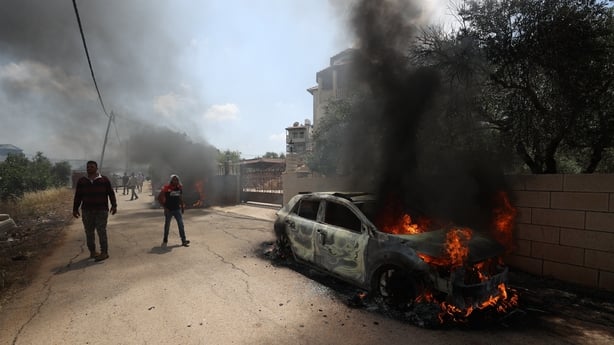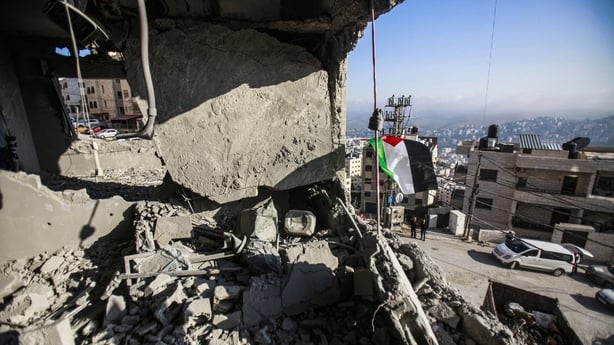The Israeli army acknowledged it "failed" to prevent an attack by Jewish settlers on a Palestinian village in the occupied West Bank, during which one villager was killed.
Revenge attacks on Turmus Ayya and other villages followed the killing of four Israelis by Palestinian gunmen on Tuesday, which militant group Hamas said was in response to an Israeli army raid on Jenin refugee camp which killed six Palestinians the previous day.
Army spokesman Daniel Hagari said troops had tried to prevent Israelis from attacking Turmus Ayya but they were stretched too thin.
"We didn't have, in the first wave, enough forces in the area they chose," he told journalists.
"We failed this time," Mr Hagari added.
Turmus Ayya residents told AFP they saw between 200 and 300 Israelis rampaging through their village on Wednesday, attacking residents and damaging dozens of houses and cars.

A delegation from more than 20 diplomatic missions, including those of the European Union and the United States, visited the village to inspect the damage.
The EU's top representative to the Palestinians, Sven Kuehn von Burgsdorff, rebuked Israel for failing to meet its obligations to protect Palestinians.
"There was no attempt or effort to stop the settlers," he said.
Israeli police said they had arrested three people in connection with the violence, without giving details.
Turmus Ayya is home to a significant number of Palestinian-Americans and residents voiced their anger at the lack of action from Washington.
"We are helpless," Yaser al-Kam, 33, said.
"I'm speaking on behalf of this peaceful town where 80% to 90% of residents are US citizens. We hold passports, does this passport matter?" Mr Al-Kam asked.
The 25-year-old Palestinian killed Wednesday, Omar Jabara, was a US Green Card holder, a US official told AFP.
The United Nations human rights chief, Volker Turk, warned "the violence, along with the inflammatory rhetoric, serve only to drive Israelis and Palestinians deeper into an abyss."
Israel's extreme-right National Security Minister Itamar Ben-Gvir, insisted what was needed in the West Bank was a large-scale "military operation".
"Terrorists eliminated, not one or two, but tens and hundreds and if necessary even thousands," said Mr Ben-Gvir, who is a settler.
'Out of control'
The new outbreak of violence in the occupied West Bank could spiral out of control, the United Nations human rights chief has warned.
This week, at least 18 people have been killed in the territory - in incursions by the Israeli military or attacks by Palestinians or Jewish settlers.
"These latest killings and the violence, along with the inflammatory rhetoric, serve only to drive Israelis and Palestinians deeper into an abyss," Volker Turk said in a statement.
So far this year, more than 200 people have died in violence linked to the Israeli-Palestinian conflict, the majority of them Palestinians.

Deadly violence has flared in recent days in the northern West Bank, a stronghold of Palestinian armed groups where Israel has stepped up military operations.
Mr Turk said this week's violence was being fuelled by strident political rhetoric and an escalation in the use of advanced military weaponry by Israel.
The UN High Commissioner for Human Rights said the sharp deterioration was having a terrible impact on both Palestinians and Israelis, and called for an immediate end to the violence.
He said international human rights law required Israeli authorities to ensure all operations are planned and implemented to prevent lethal force.
Every death caused in such context requires an effective investigation, he added.
"Israel must urgently reset its policies and actions in the occupied West Bank in line with international human rights standards, including protecting and respecting the right to life," Mr Turk said.
"As the occupying power, Israel also has obligations under international humanitarian law to ensure public order and safety within the occupied Palestinian Territory."
Mr Turk said the underlying dynamics leading to violence and the arbitrary loss of life needed to be addressed urgently, and would require political will from Israel and the Palestinians as well as the international community.
"For this violence to end, the occupation must end," he said.
"On all sides, the people with the political power know this and must instigate immediate steps to realise this."

